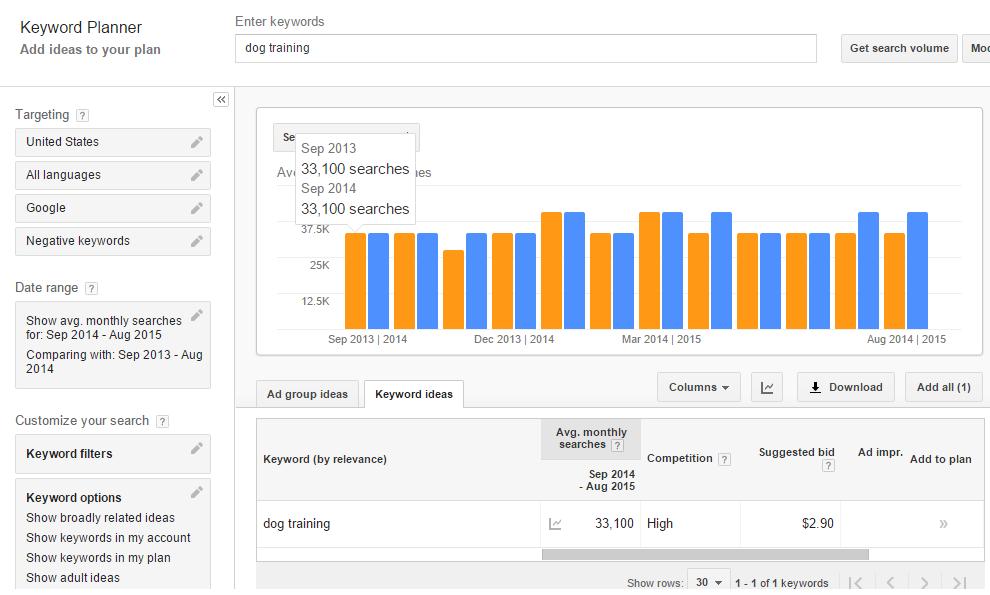

2015-10-12 12:00:00 AM | 5379 ![]() Print
Print ![]() PDF
PDF

When web surfers want to purchase something online, they go through three research phases. Web surfers usually start with general keywords.
After becoming more educated about a particular product or service, they will use more specific keywords. As soon as the web surfers know what they want, they use specific keywords.
Does the keyword represent a solution to a problem, or some kind of pain someone might be willing to spend money resolving?
Does the keyword mean someone is in „action mode‟ or ready to make a purchase? For example, “asthma symptoms” is likely to be made up of a lot of people looking to self-diagnose or investigate a condition further; whereas with “cure asthma”, you have people wanting to take action and do something about it. Similarly, words like “buy” in a keyword represent high value to your business for obvious reasons.
Does the keyword represent some kind of pleasure someone is interested in attaining – e.g. a holiday, or linked to a hobby or some other leisure activity?
When you do your research – and we‟ll look at how to do that in more depth shortly – you will generally want to find between 5 and 10 of these main keywords. With the right keyword research you can find your site ranking on different search engines; mind you the keyword popularity may vary from one search engine to another. Eg. A keyword like “seo web analyst” may generate 150,000 monthly search query on Google and 10,000 on Bing. But has stated previously that Google has the lion share of the search engines does not mean that other search engines out there are not performing but the combination of their resources to the current one will incredibly boost your site traffic and help you to stack up among competitors
The demand for a keyword – the number of people conducting a search using the keyword;
The amount of supply for a keyword – the number of websites that exist to supply that demand, i.e. websites that contain the keyword.
To help you understand how this works, we’ll use Google’s own keyword research tool, along with data from their SERPs.

https://adwords.google.com/KeywordPlanner - or search for “keyword tool” on Google
Google’s keyword tool allows you to assess the first figure above, the number of people searching for a specific keyword.
In the example here, you can see over 30,000 people every month are searching for information on dog training:
Listed below that keyword are numerous other related keywords that you could add to your main keywords or long-tail keywords lists, each with differing numbers of searches per month, and so on.
To assess the second figure above, the supply of websites that meet the keyword requirement, you need to search for the same keyword on Google, wrapping it in quotation marks, so “dog training” rather than dog training.
By using quotation marks, you are telling Google to only bring back results containing that exact phrase, so you can find out exactly how many pages contain the same keyword.

You can see here that it brought back nearly 19 million competing pages:
So for the keyword, “dog training”, the demand is 40,500(August 2015) and the supply, 18,600,000.
Due to the relatively high level of competition, but the very high potential traffic levels, you could have this as a main keyword that you were looking to rank high for.
If the demand was low, it wouldn’t be worth trying to compete against the millions of other pages vying for that keyword term … but in this case the traffic levels make it potentially worthwhile.
There’s a lot more to keyword research than space allows for in this report, but hopefully you get the general idea.
Let’s now run through an example of a long-tail keyword – often using a phrase like “how to” together with one of your main keywords can help you discover suitable long-tail phrases, which can form suitable article titles too … ideal for article marketing purposes, as the title’s ready made for you, and is already optimized for the keyword in question!
For this example base on illustrations, Let's say we searched for “how to train dog” on Google’s keyword tool, and came up with the following:
So, for the keyword, “how to house train a dog”, the number of people searching each month is 5,400 … now to assess the supply:
Only 44,400 competing pages … probably at the upper end in terms of competition levels for a long-tail keyword phrase, but a properly optimized article could easily compete with this and could well end up appearing within the first couple pages of search results.
This keyword has decent traffic levels too … in fact, this could be used as a main keyword phrase too if you’re in that niche, but in this case it’s just as valid as a long-tail keyword.
Further research revealed other long-tail keyword possibilities, which would all form the basis of some great content:
“house training older dogs” – 1,900 searches, 9,140 competing web pages
“leash training dogs” – 8,100 searches, 29,100 competing web pages
“training boxer dogs” – 2,400 searches, 10,900 competing web pages
Hopefully you get the idea of how to pursue this in your own niche.
Let’s do an example of a keyword phrase that might not be so suitable as a long-term keyword phrase – “training dogs not to bite” has only 260 searches a month, but nearly 20,000 competing web pages.
It could work, but the traffic levels are very low in proportion to the level of competition, and you’ll likely find better examples of long-tail keyword phrases that would be more valuable to you longer term.

I am a seo web analyst and have a love for anything online marketing. Have been able to perform researches using the built up internet marketing tool; seo web analyst as a case study and will be using the web marketing tool (platform).
How To Fix Cloudflare Error 522 Connection Timed Out
How To Optimize Cache Performance via HTACCESS Apache Server
How To Fix GA4 Showing Wrong Domain Traffic
How To Reactivate Google Adsense Account
How Do You Write Pitch Deck That Wins Investors
Effective Lead Magnet Funnel Examples For Businesses
How To Promote FMCG Products Using Digital Marketing
The Main Objectives Of SEO in Digital Marketing
How Artificial Intelligence Is Transforming Digital Marketing
Google CEO Sundar Pichai: Search will profoundly change in 2025